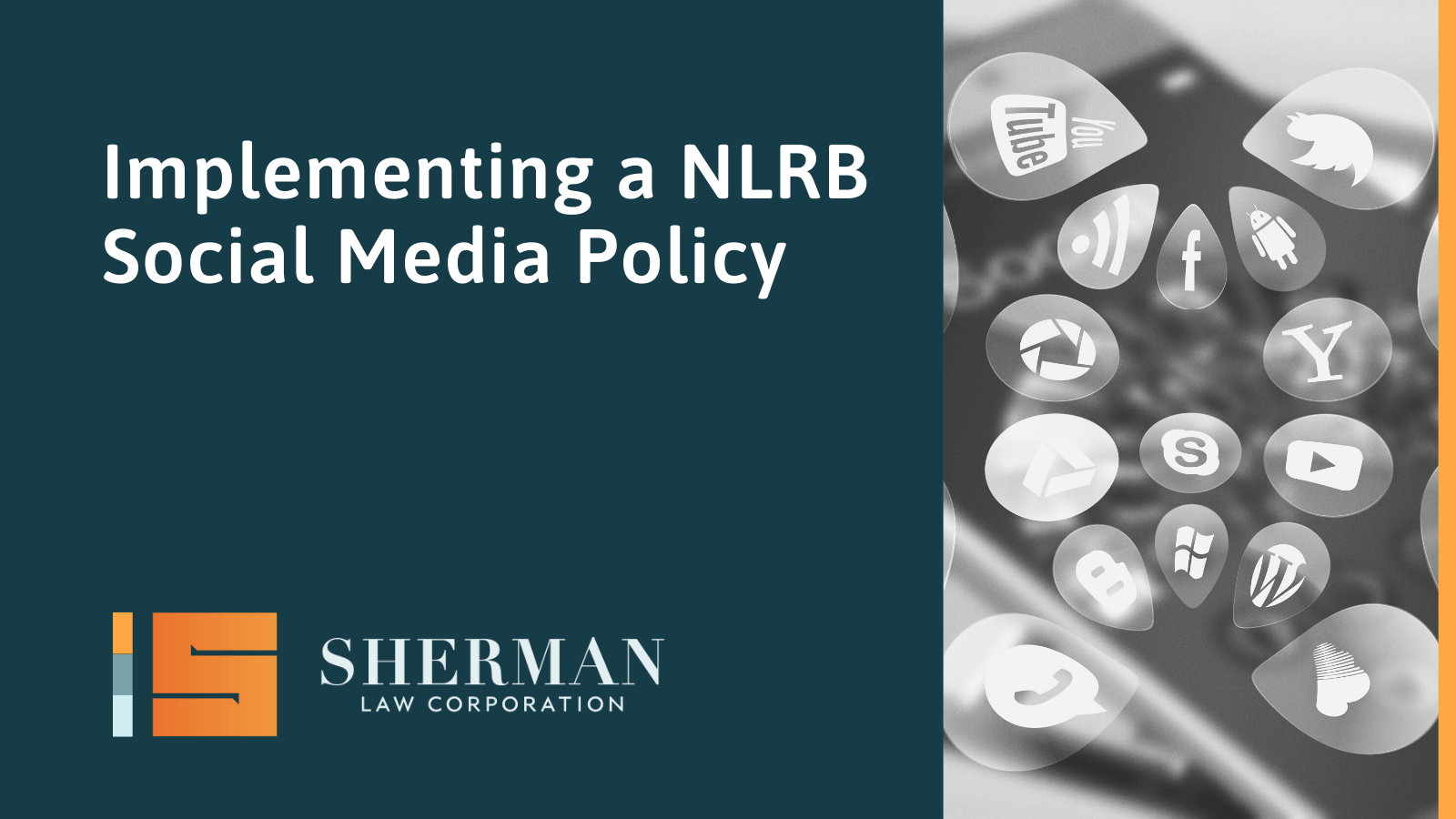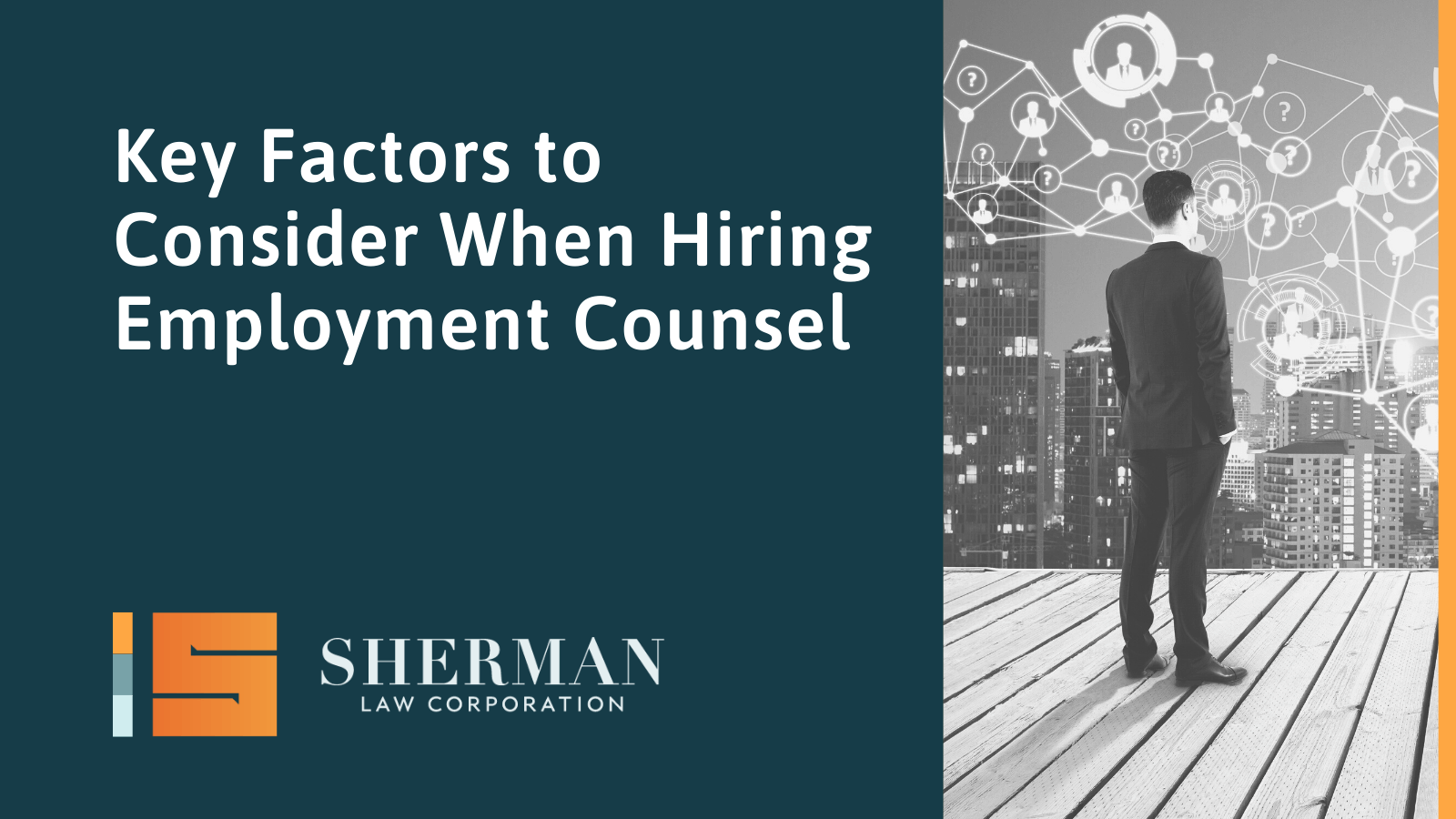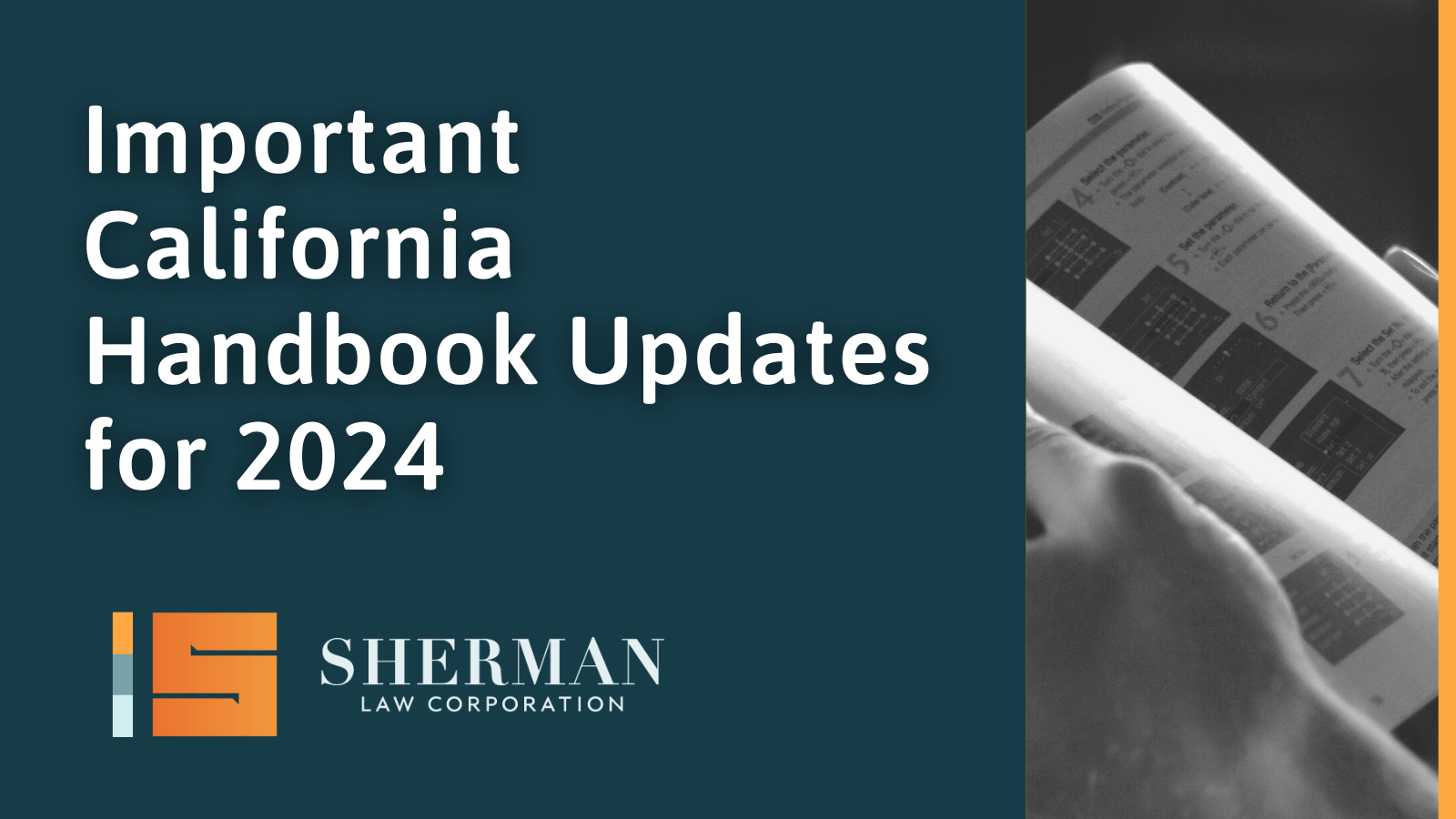
Implementing a NLRB Social Media Policy
While it is impossible to identify all unprotected social media content, the following examples (even if during non-work time in non-work areas using personally-owned PMD’s), can provide further guidance to employees of conduct that is in violation of this policy:
Not a day goes by that the National Labor Relations Board (“NLRB”) does not strike down another employer policy because it concludes that the policy violates a terminated employee’s right in a union or non-union workplace to exercise their protected right to discuss, contest or engage in protected and concerted activities, involving or concerning their wages, hours, and/or any other terms and conditions of employment. Then, as a result, the NLRB orders the employer to reinstate the rogue employee(s) with back pay who blasted a profanity-laced diatribe on social media taking down the employer and its management solely because the employee(s) was lucky enough to vent about their pay and what they perceive to be poor working conditions.
No harassing, discriminatory, threatening, fraudulent, or other unlawful offensive content or violation of Company policies even during non-work time in non-work areas using personally-owned PMD’s
While it is impossible to identify all unprotected [i.e., by the NLRB] social media content, the following examples (even if during non-work time in non-work areas using personally-owned portable mobile devices (“PMD’s”), provide further guidance to employees of conduct that is in violation of company policy based on the actual cases where the NLRB upheld the employer’s policies and termination of the accused employee(s):
- Disclosure of Confidential information that is not related to employees’ wages, terms and conditions of employment protected by the NLRA.
- A temporary employee at Microsoft posted photos of Macintosh computers arriving at Microsoft with the tag line: “Even Microsoft wants G5’s.”
- Disclosure of personal health information about employees, client/patients, etc.
- Employees of a hospital were terminated after posting unauthorized pictures of a suicidal patient and his x-rays on their public Facebook accounts and circulating the photos in text messages.
- After processing a workers’ compensation claim an employee posted on his Facebook page (which was linked to his corporate email account) “Isn’t [it] amazing how Jimmy experienced a 5 way heart bypass just one month ago and is back to work, especially when you consider George Shoun’s shoulder injury kept him away from work for 11 months and now he is trying to sue us.”
- Insubordination
- Employees’ re-hire offers were rescinded to two employees who were to work at a teen center after they engaged in the following Facebook exchange evidencing their planned insubordination. “I don’t want to ask permission…” “Let’s do some cool shit, and let them figure out the money;” “field trips all the time to wherever the f*ck we want!” “play music loud;” “teach the kids how to graffiti up the walls…;” “we’ll take advantage;” “I AIN’T GONE NEVER BE THERE;” “they start loosn kids i aint helpn;” “Let’s f*ck it up.”
- Ranging from uncivil, angry, insulting, and offensive posts to rants that include, profanity, inflammatory, highly charged, vicious, abusive, contemptuous, reckless and/or malicious statements by an employee (who is not discussing the terms and conditions of his/her employment), griping or bad mouthing the Company, his or her co-workers, management, customers, and other business partners.
- An employee of a home improvement store who was reprimanded by her supervisor during the workday for failing to carry out some task, updated her Facebook status from her personally-owned cell phone during her lunch break using an expletive and the name of her employer’s store. Four individuals, including co-workers, “liked” her status and two others commented on her status. 30 minutes later, the employee posted a comment that the employer did not appreciate its employees, to which no one responded.
- An employee posted angry profane comments on her Facebook wall ranting against coworkers and her employer indicating that she hates the people she works with at work, that they blame everything on her, that she had anger problems, and that she wanted to be left alone.
- An employee respiratory therapist sitting in the back of an ambulance with a coworker paramedic posted on Facebook from her personal cell phone that it was driving her nuts that her coworker was sucking her teeth. Two Facebook friends who were not employed by the hospital responded with supporting comments, to which the employee replied that she was about to beat her coworkers with a ventilator.
- Following the mass shooting in Aurora, Colorado, an employee of the National Rifle Association tweeted on the company Twitter account just a few hours after the tragedy “Good morning, shooters. Happy Friday! Weekend Plans?”
- A bartender posted comments in a Facebook conversation with his step-sister expressing his hope that the employer’s “redneck” customers “choke on glass as they drove home drunk.”
- After a group of employees on Facebook were discussing a social event, one of the employees retold a conversation she had with her supervisor where she allegedly told her, “back the freak off.” Then, the employee posted that certain supervisors “are full of shit” and “FIRE ME… Make my day…”
- A bartender posted a status update on her Facebook page indicating that she had learned that a coworker bartender was a “cheater who was screwing over” the customers. When a former coworker asked if the accused was stealing, the bartender replied that the co-worker bartender was using the mix instead of the premium alcohol and that it had been mentioned at a staff meeting that the liquor cost was up. Later that day, the bartender updated her post stating, something to the effect that dishonest employees along with management that looks the other way will be the death of the business.
- A customer service manager at Walmart posted on his Facebook page, “Wuck Falmart! I swear if this tyranny doesn’t end in this store they are about to get a wakeup call because lots are about to quit!” The employee later posted additional comments using an expletive against the practices of a named assistant manager.
- A waitress on her own personal time complained about a tip from an “a*hole customer” who happened to be one of her Facebook friends. The Facebook friend showed the post to the manager, who then terminated the waitress becasue it is the equivalent of the waitress calling the customer an “a*hole” in person (although publicly).
- Posts that can be construed as threats of violence
- A Frito-Lay employee wrote on Facebook that he was “a hair away from setting it off in that b-,” referring to the warehouse where he worked after his supervisor said he would lose attendance points if he left work early because he did not feel well. The human resources manager believed that the comment sounded like a threat to shoot everyone in the warehouse.
- A parole officer with a prior incident of posting an inappropriate message on social media, a history of ill will, and charges posted on Facebook of a threatening statement towards a co-worker under her supervision, “I’ll gimp into work tomorrow. I guess I could just shoot them all… lol! ARE YOU KIDDING ME? ‘MEANING I CAN’T CHASE THEM! OH MY GOD! YOU PEOPLE REALLY DO NEED A LIFE! LIKE NO LAW ENFORCEMENT OFFICER ‘EVER’ MADE THAT TYPE OF COMMENT. YOU MAKE ME LAUGH OUT LOUD!”
- Posts that can be construed as racist, sexist, or otherwise discriminatory or bigoted.
- Employee who made discriminatory statements or sexual innuendos regarding a client.
- The Automobile Club of Southern California fired 27 workers for posting on MySpace the weight and sexual orientation of coworkers.
- A reporter posted as a joke on his blog that his African-American neighbors were partying late into the night and speculated whether similar circumstances might have led to the assassination of Martin Luther King, Jr.
- In response to his friends’ comments, an employee called his manager a “super mega puta” and if the situation does not improve, then Walmart “could kiss my royal white ass!”
- A Walmart assistant manager posted a picture of a Muslim woman shopping at Walmart in traditional dress with the following post, “Halloween come early this year … do they really have to f– dress like that … your [sic] in my country …get that f– in s– off!!!”
- A Walmart door greeter posted on Facebook “Better health care means that disabled and chronically ill people live longer.. Reader’s Digest.. But is that a good thing?… Ever wonder why Bible is pronounced “buy-bull”?… “The government needs to step in and set a limit on the amount of kids people are allowed to have based on their income. If you can’t afford to feed them, you shouldn’t be allowed to have them!!!”
- Professional Golf Association President referred to pro golfer Ian Poulter as “Lil Girl” on Twitter when stacking up Poulter’s feat’s next to Nick Faldo tweeted “Really? Sounds like a little school girl squealing during recess. C’MON MAN!”
- Jokes, rumors, or other statements that ridicule, criticize, slander, and/or put down the Company, its management, its employees and/or customers that the employee knows to be false, in bad taste, and/or calls into question the employee’s underlying judgment and decision-making ability. For example,
- Staff employees working for a Congressman tweeted a series of messages under pseudonyms from non-work Twitter accounts:
- “My coworker just took a shot of Jack crouching behind my desk. We have unabashedly given up on just about all things work-related.”
- “I’m pretty sure I couldn’t pass a field sobriety test right now. Looking forward to a day in the office.”
- “I could have used another day away. The silver lining is that I don’t have to see my idiot boss.”
- Posting pictures, video or other content, some of which may have been intended to be humorous, go viral, create a social media firestorm, or sabotage the Company, for example, where the employee displays heinous, unthinkable, offensive, and/or vulgar acts that not only violate Company policies, but may also expose the Company and/or employee to liability, threatens the very existence of the Company, and/or its business relationships, customer base and/or its reputation.
- Unsanitary food preparation in restaurants
- Image of person in Burger King kitchen standing on top of two open containers of shredded lettuce posted on a website anonymously with the caption, “This is the lettuce you eat at Burger King.”
- Image of Kentucky Fried Chicken employee in her uniform at work in the kitchen with her tongue sticking out as if she was about to lick a plate of mashed potatoes. The implication was that these mashed potatoes were being served to customers. KFC’s investigation concluded that this was taken after the restaurant was closed and the mashed potatoes were not served.
- Two employees at Domino’s store in their Dominos’ uniform uploaded a video to YouTube sticking cheese up their nose and putting it on a sandwich that was purportedly going to be sold to a customer. The two employees were not only terminated they were charged with felonies.
- Pizza hut employee fired for peeing in the kitchen sink.
- Cook at Chili’s restaurant posted a picture on Facebook of himself without a shirt on in the kitchen who labeled the pictures “Sexy Cook of Chili’s” and even tagged the restaurant in the post.
- Highly Offensive and tasteless hashtag use
- Tweet by American Red Cross employee talking about how she was drinking beer and #gettingslizzered (drunk). Red Cross prohibits donators from consuming alcohol before giving blood.
- Tweet by Kmart employee in aftermath of Newtown shooting tragedy used hashtags like #PrayforNewtown and #CTShooting which were appropriate. It was when they added a third hashtag #Fab15Toys to promote its stores during holiday shopping season that the social media blunder by the employee caused a social media firestorm.
- Immediately following the controversial Casey Anthony not guilty verdict, Entenmann’s used the trending hashtag #notguilty, not considering that the verdict of a mother accused of killing her child may not be appropriate to promote their “tasty treats.” The offensive tweet was: “Who’s #notguilty about eating all the tasty treats they want?!”
- Staff employees working for a Congressman tweeted a series of messages under pseudonyms from non-work Twitter accounts:
By providing case examples, employees will fully understand the conduct that will get them fired and send your Company into a social media panic.




